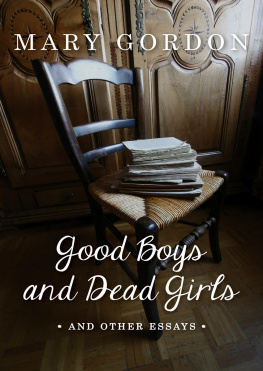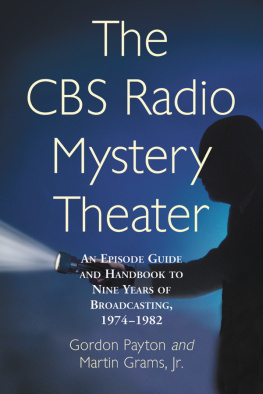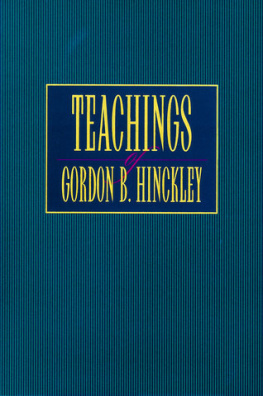Mick Gordon - Theatre and the Mind
Here you can read online Mick Gordon - Theatre and the Mind full text of the book (entire story) in english for free. Download pdf and epub, get meaning, cover and reviews about this ebook. year: 2011, publisher: Oberon Books, genre: Religion. Description of the work, (preface) as well as reviews are available. Best literature library LitArk.com created for fans of good reading and offers a wide selection of genres:
Romance novel
Science fiction
Adventure
Detective
Science
History
Home and family
Prose
Art
Politics
Computer
Non-fiction
Religion
Business
Children
Humor
Choose a favorite category and find really read worthwhile books. Enjoy immersion in the world of imagination, feel the emotions of the characters or learn something new for yourself, make an fascinating discovery.

- Book:Theatre and the Mind
- Author:
- Publisher:Oberon Books
- Genre:
- Year:2011
- Rating:3 / 5
- Favourites:Add to favourites
- Your mark:
- 60
- 1
- 2
- 3
- 4
- 5
Theatre and the Mind: summary, description and annotation
We offer to read an annotation, description, summary or preface (depends on what the author of the book "Theatre and the Mind" wrote himself). If you haven't found the necessary information about the book — write in the comments, we will try to find it.
In this collection of seven provocative essays, acclaimed theater director and playwright Mick Gordon argues that the theater represents a physical corollary of the invisible workings of our minds. Gordon draws upon his five years of experience working with leading neurologists and cognitive psychologists.
Theatre and the Mind — read online for free the complete book (whole text) full work
Below is the text of the book, divided by pages. System saving the place of the last page read, allows you to conveniently read the book "Theatre and the Mind" online for free, without having to search again every time where you left off. Put a bookmark, and you can go to the page where you finished reading at any time.
Font size:
Interval:
Bookmark:
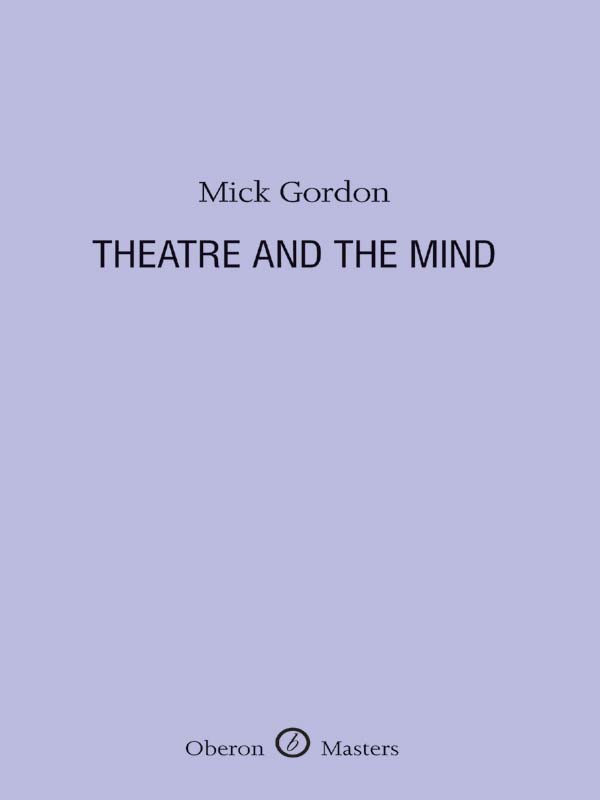
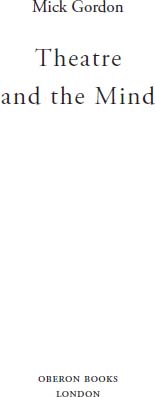
First published in 2010 by Oberon Books Ltd
Electronic edition published in 2012
Oberon Books Ltd
521 Caledonian Road, London N7 9RH
Tel: +44 (0) 20 7607 3637 / Fax: +44 (0) 20 7607 3629
e-mail:
www.oberonbooks.com
Copyright Mick Gordon, 2010
Mick Gordon is hereby identified as author of this work in accordance with section 77 of the Copyright, Designs and Patents Act 1988. The author has asserted his moral rights.
You may not copy, store, distribute, transmit, reproduce or otherwise make available this publication (or any part of it) in any form, or binding or by any means (print, electronic, digital, optical, mechanical, photocopying, recording or otherwise), without the prior written permission of the publisher. Any person who does any unauthorized act in relation to this publication may be liable to criminal prosecution and civil claims for damages.
A catalogue record for this book is available from the British Library.
PB ISBN: 978-1-84002-876-8
E ISBN: 978-1-8494-3862-9
eBook conversion by Replika Press PVT Ltd, India.
Visit www.oberonbooks.com to read more about all our books and to buy them. You will also find features, author interviews and news of any author events, and you can sign up for e-newsletters so that youre always first to hear about our new releases.
I M IN A theatre. The lights go down. Silence. Im in the dark. Nothing. I hear music. Information. Some lights illuminate. Information. I see a portion of an obviously artificial setting. Information. A person enters; an actor. He is going to pretend to be someone that he is not. I do not think this strange, I do not think at all. I search his face. Information. He is wearing a costume. Information. He walks in a certain way. Information. I watch and listen. Then the actor speaks.
All theatre happens in the mind. What occurs on the stage is a contrivance, an illusion, presenting us, the audience, with specifically chosen information. The quality of that information and how it is communicated will vary, but regardless of quality, when we are in the theatre our minds suspend their disbelief and legitimise the illusion. And it is our minds that pull the experience of theatre together with a single silent question: Whats the story?
Again the lights go down. Silence. Im in the dark. Nothing. I hear music. The radio? Yes, its the radio. Im in a bed. It must be my bed. I open my eyes. I see a portion of a room. A bedroom. Its my bedroom. A person enters; a woman. Its my wife. I do not think this strange, I do not think at all. I search her face. Shes preoccupied. No. Shes pissed off. She is wearing some clothes but not fully dressed. Ah! A fashion crisis. She walks in a certain way. Quickly. Shes tense. I watch and listen. And then she speaks.
All life does not happen in the mind. But it is our minds that consciously experience and explain all life. And as I wake from a dreamless sleep it is my mind that pulls my life together, with the same silent question: Whats the story?
Minds are what brains do. They are brains in action. The brain evolved as a means of orchestrating adaptive interaction between the organism us and the physical and social world. The mind is the product of that interaction. The most important biological function of the brain is to generate behaviours, which is to say, actions that promote the welfare of the organism. In situations of rest or emergency the brain instructs reflex action. When not in situations of rest or emergency the brain has time for consciousness. These are the moments when we experience ourselves as our selves.
Our minds make us up. It is our minds that consciously experience our emotions, thoughts and actions. And it is our minds that consciously consider our future emotions, thoughts and actions. Our idea of our self, of what it means to be a person and indeed what is means to be a certain type of person, is therefore dependent on our mind. They are our storyteller, rationalizing and editing explanations for our feelings, thoughts and behaviours, settling on the story that seems most plausible, and offering imagined future scenarios based on that story. And so we conclude that we have made choices. And this is why we believe we have free will.
But consciousness and the stories our minds are telling us happen after the fact. Action, emotion and thought happen first. Consciousness and its accompanying story happen second. I find myself walking outside and putting a cigarette in my mouth. As Im about to light it: Whats the story? You want a cigarette. Our minds tells us stories that justify our actions, thoughts and feelings before giving us access to choice or to alternative points of view. This is why in an argument most of us believe our opening position to be the reasonable one. In life, it is not so much a question of us weaving our story, but of our story weaving us.
Consider that statement again: In life, it is not so much a question of us weaving our story, but of our story weaving us. This suggestion is very difficult to accept because it is counter-intuitive. It is not how we subjectively experience life. But consider this: Are you having these thoughts or are these thoughts having you?
Theatre is a corollary of the mind. And how we experience theatre is a reflection of how we experience our minds. In the theatre the story has already been decided. And the information presented, which is the story being told, is being presented after that fact. However, we experience theatre in the present tense, which is to say, as the subjective experience of a story unfolding. Our minds suspend their disbelief to deny the fact of the matter: that the story in front of us has already been determined. And so our minds willingly collude in the artifice. This is a reflection of our subjective experience of life, where we intuitively believe that we are in control of our own story and constantly making up our minds.
Over two thousand years ago, the Greek philosopher Aristotle wrote Poetics. It is the earliest surviving work of dramatic theory. In it he articulates and examines what have become the first principles of Western drama. And he offers an analysis of successful drama, concluding that plot, by which he means, story, is the single most important element of drama and that good plots follow the cause and effect of an event or action in a plausible, yet surprising, manner.
From before Aristotles codification of drama to the present day, the theatre has reflected the minds urge to narrative. And we will always enjoy plausible and surprising stories because it is through stories that we subjectively experience and consciously explain life. And so we feel the formula to be right. Understanding why we assume the formula to be right can assist us in our daily lives by helping us to understand and perhaps even challenge the stories our minds tell us about our selves. It can also assist theatre-makers in their telling of their tall tales. Furthermore, understanding the minds urge to narrative and the intuitive story telling that theatre reflects, offers theatre-makers the opportunity to challenge their own minds and their chosen art form. And so in turn broaden the opportunities and challenges that the theatre can offer us, the audience.
We are not in control of our own story. Just as in the theatre, the story in front of us has already been determined. At this moment, we are the latest version of the story our mind is telling us. And this story is powerful. We find it extremely difficult to challenge, let alone change. Imagine a Pentecostalist attempting to change an Islamists mind. Remember the last time you were in an argument, when someone else attempted to change your mind.
Font size:
Interval:
Bookmark:
Similar books «Theatre and the Mind»
Look at similar books to Theatre and the Mind. We have selected literature similar in name and meaning in the hope of providing readers with more options to find new, interesting, not yet read works.
Discussion, reviews of the book Theatre and the Mind and just readers' own opinions. Leave your comments, write what you think about the work, its meaning or the main characters. Specify what exactly you liked and what you didn't like, and why you think so.

